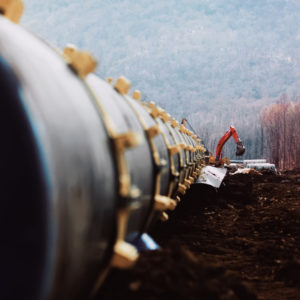California may be facing an energy shortage and rolling blackouts as a heat wave hits the state, but that is not stopping officials from trying to shut down another international pipeline.
Attorneys general from Washington, Oregon, and California are asking the Federal Energy Regulatory Commission (FERC) to deny a proposed expansion of the Gas Transmission Northwest (GTN) Express pipeline. They acknowledge the pipeline, which runs from Alberta, Canada to the Golden State, would “increase the amount of natural gas carried by the pipeline by 150 million cubic feet per day.”
But unlike energy sector observers and retail consumers warning of a natural gas shortage, those state officials – all Democrats – say the increased fuel supply is a bad thing.
The additional natural gas into the West Coast’s energy grid would “result in increased greenhouse gas emissions and downstream impacts on nearby environmental justice communities,” they argue.
GTN falls under the umbrella of TC Energy, a Canadian business and parent company of Keystone XL.
The attorneys general also claim GTN’s application “has not demonstrated sufficient evidence of a public need or that the project is in the public interest.” They even took a shot at FERC, saying an Environmental Impact Statement (EIS) of the pipeline “fails to analyze these impacts” or to reconcile the expansion with state laws and policies promoting renewable energy.
“(That is) in violation of the Natural Environmental Policy Act,” they said in a statement.
Grow America’s Infrastructure Now (GAIN) said there is nothing to be concerned about with this pipeline. For starters, GAIN said the GTN pipeline currently delivers natural gas from Alberta through a pipeline that runs from Idaho to eastern Washington, through Oregon, and connects with existing pipeline networks in California. According to GAIN, the expansion project would increase capacity and allow for more clean natural gas to be distributed.
“The federal government has comprehensively reviewed the project, ultimately finding its impact would ‘not be significant,’” said GAIN spokesperson Craig Stevens. “Further, their analysis confirms the current proposed route is the best available, stating, ‘the EIS also concludes that no system or other alternative would meet the project objectives while providing a significant environmental advantage over the project as proposed.’”
Critics argue the states’ opposition to the pipeline expansion appears to be more political than environmental.
“This strikes me as a political effort that does nothing to help the environment but may risk increased heating costs,” said Todd Myers, Environmental Director at the Washington Policy Center.
Pointing to Washington and California, Myers said both have very strict CO2 emissions caps, and the protest by the attorneys general does nothing to change those.
“This effort simply changes how natural gas is delivered, not how much is allowable to be used or demanded,” said Myers. “So, this does not change the total CO2 emissions in either state and does not reduce the risk from climate change. It simply risks making it more expensive to legally heat homes.”
The attorneys general are not budging. Attorney General Rob Bonta (D-Calif.) maintains expanding the pipeline’s capacity would have significant environmental and public health impacts and is out of step with state and federal climate goals.
“FERC can’t honestly say otherwise,” Bonta said. “The reality is, when we expand gas infrastructure, it’s all too often minority, low-income, and Indigenous communities that pay the price.”
Attorney General Bob Ferguson (D-Wash.) agreed adding, “this pipeline is bad for the environment and bad for consumers.”
That is why these chief law officers claim they joined forces.
“The West Coast is experiencing very real impacts of climate change and leading the climate fight,” said Attorney General Ellen Rosenblum (D-Ore.).
Myers said the attorneys general are making contradictory arguments, something he thinks indicates they are grasping for arguments rather than addressing real risks.
“Claiming on the one hand that expanding the pipeline will increase the use of natural gas and CO2 emissions while also claiming that, in their words, “restrictive natural gas policies in the affected states” will make it hard to use the pipeline efficiently,” said Myers.
In the 19 months since President Joe Biden unilaterally canceled the Keystone XL pipeline, the political debate still rages. Biden, who campaigned on fighting climate change and transitioning the U.S. away from fossil fuels, said Keystone XL “disserves the U.S. national interest.”
Since then, global natural gas supplies have been pummeled by supply chain issues, soaring post-pandemic demand, and Russia’s invasion of Ukraine. In Europe, businesses and families are facing restrictions on heating this winter due to Russian-imposed restrictions on the natural gas supply that has triggered a 400 percent increase in wholesale gas prices.
And yet three additional major U.S. pipeline projects, the PennEast, Atlantic Coast, and Constitution, have all been canceled in the face of lawsuits and regulatory resistance in the past two years.
Why, consumer advocates ask, would the U.S. want to restrict the flow at a time when utility costs for average families are soaring?
“American consumers continue to bear the brunt of volatile energy costs, largely driven by misguided energy policies,” Stevens said. “Although prices have stabilized in recent weeks, now is the time to make investments into energy infrastructure to ensure access and affordability for consumers.”
If the attorneys general are successful, Stevens said he thinks their actions would cost the U.S. construction jobs, weaken the economy, and make the world more reliant on energy from countries hostile to the U.S.
“More broadly, it will also have a chilling effect on infrastructure investment across the nation.”
Please follow DVJournal on social media: Twitter@DVJournal or Facebook.com/DelawareValleyJournal

